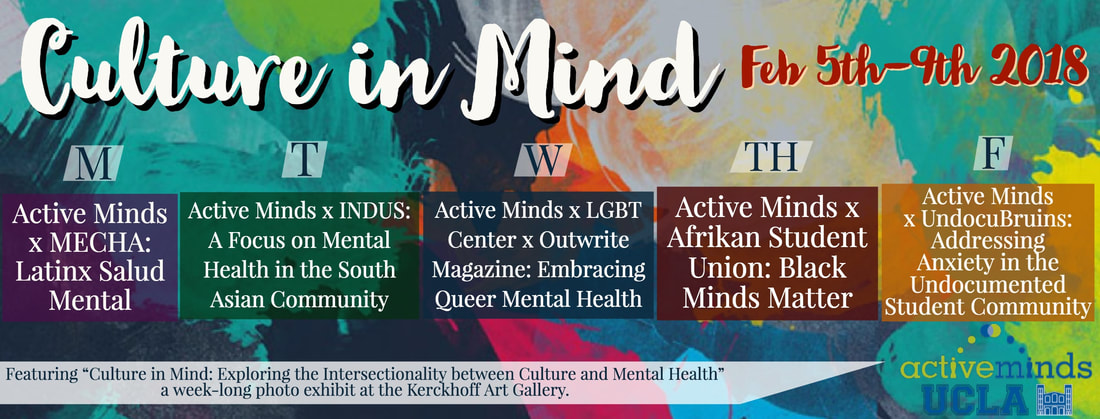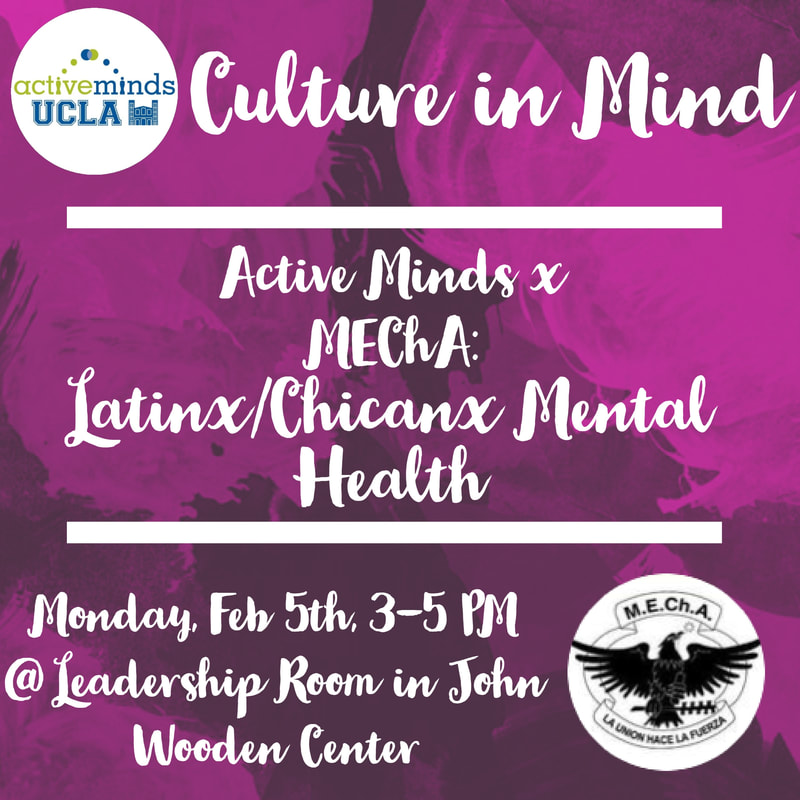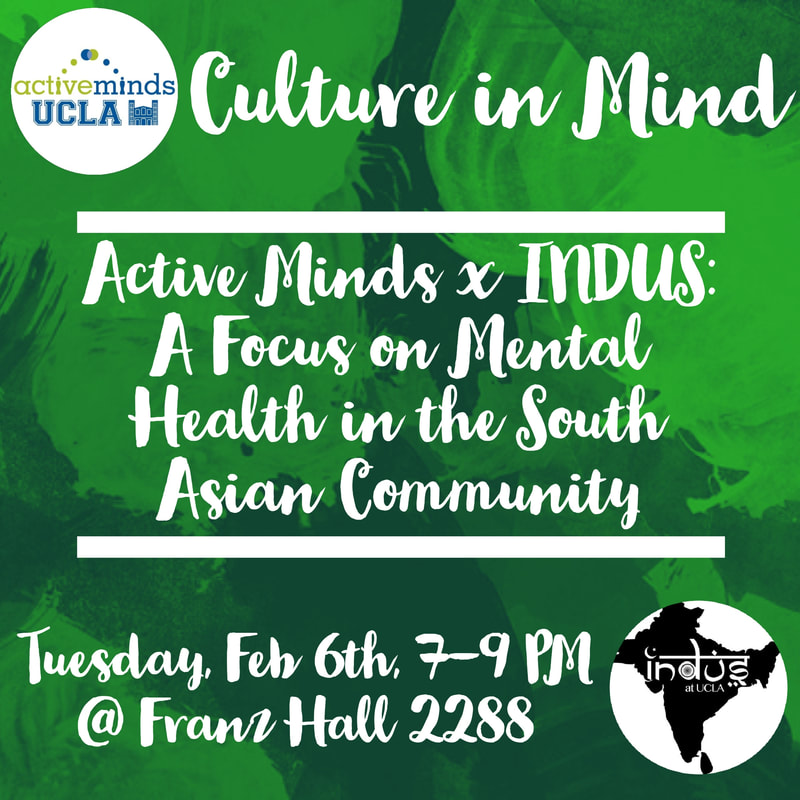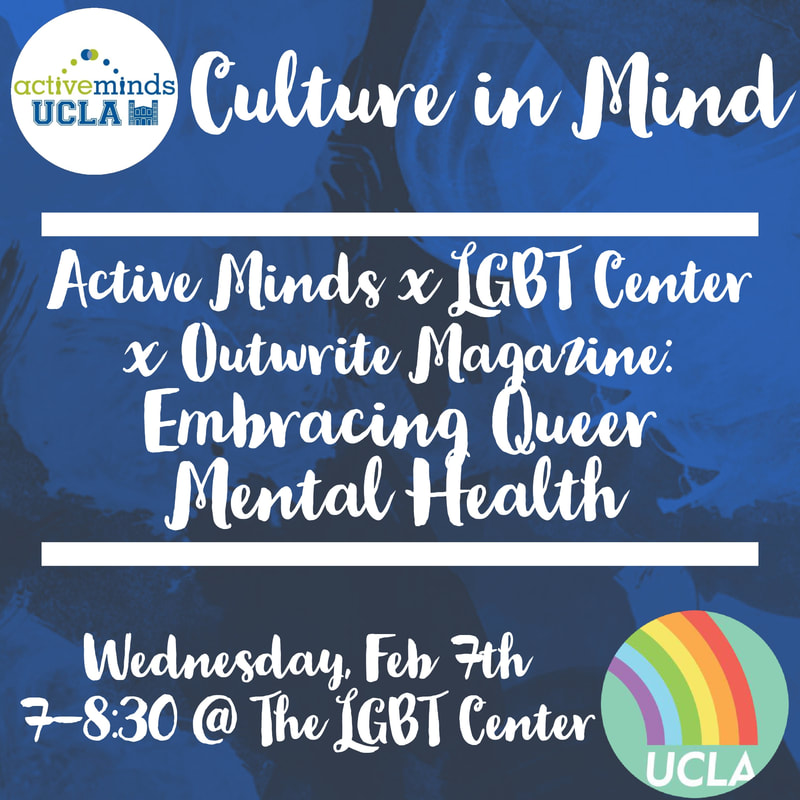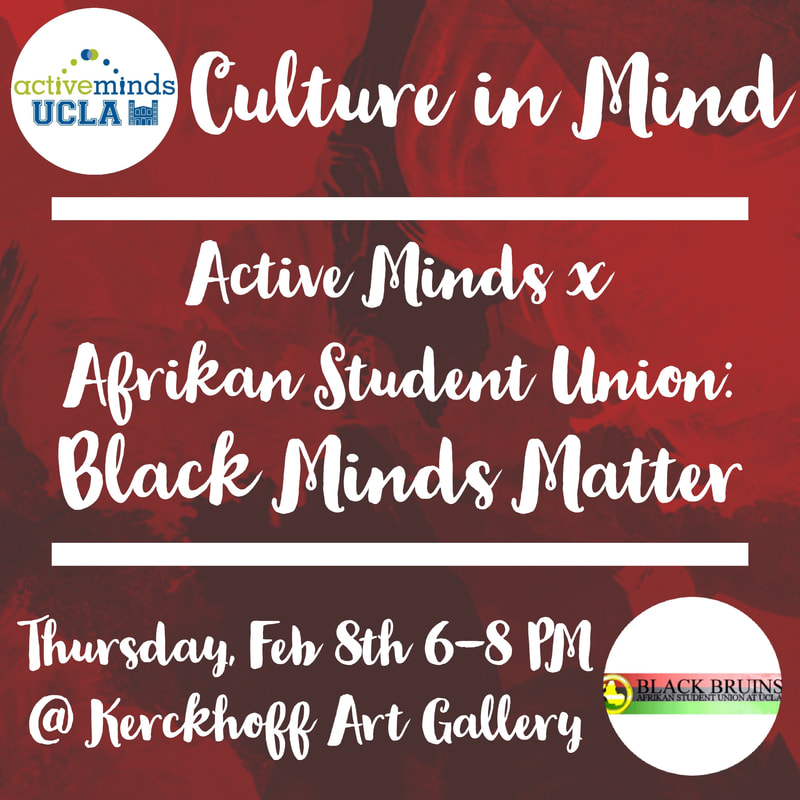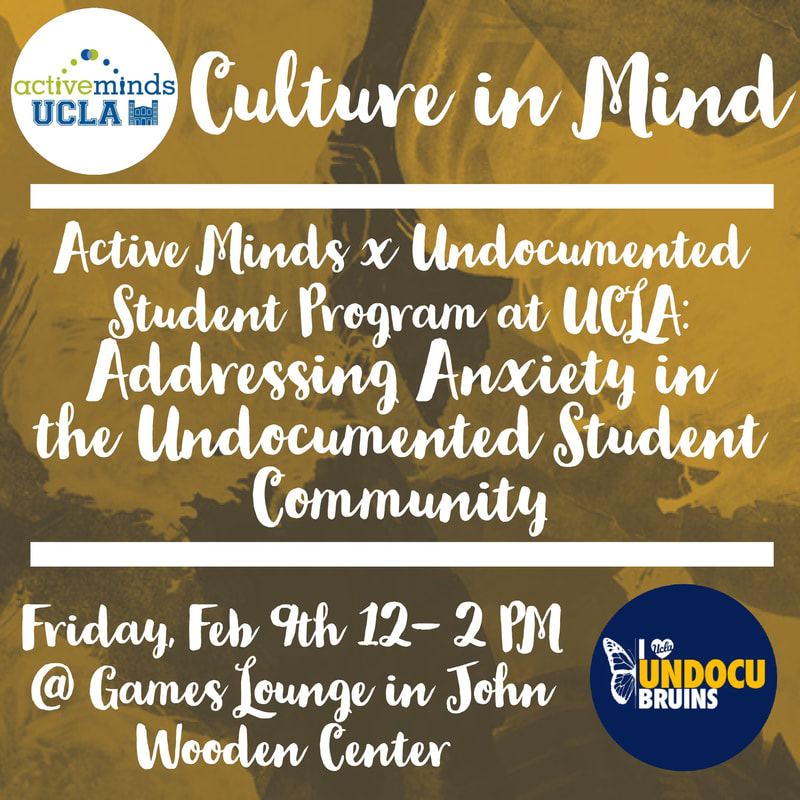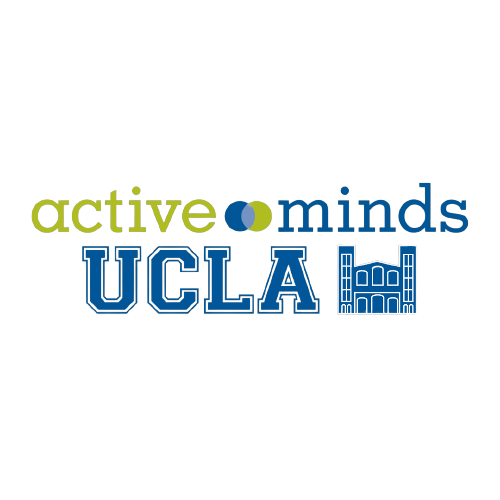|
This year, Active Minds UCLA is doing a social media series to showcase the diverse experiences of the student body with mental health.
Mental health and mental illness are difficult topics to talk about as it is, and that difficulty is only exacerbated by the social stigma attached to these topics. By sharing student experiences with mental health, we hope to show those struggling that they are not alone and contribute towards creating an environment in which people are able to talk about mental health more openly. Remember, you are NOT alone. We're here to listen. -- To share your experience with anything mental health/mental illness related, fill out the form below. Select responses will be featured on our blog at activemindsucla.com and/or on our social media. All submissions will be kept anonymous, unless indicated otherwise. forms.gle/8xN7Ztb8rA2mLBQE8
0 Comments
Tap, tap. Instant gratification sent.
Social media, including, Instagram, Twitter, Snapchat, Facebook, and even LinkedIn, have spun the world of mental health education in full circle. From issues regarding instant connections, to societal pressures and comparing yourself to one another, the Google searches, research articles, and news titles that talk about the effects of social media on teenagers mental health are plentiful. However, this is not the only way social media has impacted mental health, and not the aspect of it that should be focused on. Instead, it is important that as a society we choose to use social media as a tool to provide a safe community and change the conversation (and stigma) around mental health. As a user hits that heart button, thumbs up emoji, or double taps to give a photo a like, they are fueling the need for gratification of the rising generation of millennials. This is not necessarily negative, gratification is very important in motivation and drive. However, if someone spends forty-five minutes taking different photos, ten minutes deciding which photo will receive the largest response, another ten minutes editing the photo that no longer resembles who they are, but instead who they wish to be, they are developing this falsified version of self. Not only is that positive feedback from friends and followers only providing a compliment to this romanticized version of the person, it also provides a warped view of reality for others to compare themselves to. It is hard trap to not fall into, but it is the reality that social media creates. It doesn’t have to be this way. Advocates, educators, students, employees, and anyone else who has access to an audience, should instead use the speed of communication on social media as a tool to promote better mental health. Users can start a conversation, make people aware of resources, provide advice, and foster a community where people can come together to share their stories of both triumph and struggles, because that is what is real. There have been efforts by many larger therapy establishments to create a branch of help online, allowing access to so many more people who may be struggling. This allows those who are not ready or not able to make an appointment for an in person visit to a therapist, to have immediate access and response when in need. UCLA’s Counseling and Psychological Services has an online service where students can ask questions without having to face the increasingly long waitlist to get an appointment. This, along with the online services of the National Suicide Prevention Lifeline and many others, allows immediate, online, anonymous chats with people who are trained to help with emergency situations. Such outlets prove the power of using the accessibility and speed of these online communication tools to better the world of mental health. These larger organizations have provided a space for the necessary private conversations to take place, however, destigmatizing mental health and starting a conversation, is something that can take place on social media. This can be as simple as correcting a friend, posting about one’s own struggles with mental illness to help normalize it, or constructively criticize certain media for their misrepresentation of mental health to educate others . In simple terms, we as a society need to leave behind the negative aspects of social media and instead, use it to stand up for what we believe in. People commonly use mental illnesses as colloquial references to a temporary feeling, if we, as educated advocates of better mental health, see this, it is okay to step in and educate. The misuse of a word which undermines the true meaning of a mental illness or symptom is hurtful to many and diminishes what those who are struggling may be feeling. Not only is it okay to do this, but it is necessary to open people’s eyes to the effect of their words. Sharing one’s own story is not an easy feat, and if you do not feel comfortable doing it, then don’t. However, if you do, it may help others feel like they are not alone. While one in five people live with a mental illness at some point in their life, we cannot see it, and this makes people shy away from sharing their story. If you are able to share, it will create a safe space for others to come and feel like part of a community. The information out there is not always correct, and we know this. This flurry of fake news has everyone worried. Many times violence is blamed on a mental illness, movies and television series will provide false representations of mental illness, or news articles will provide misleading representations. As easy as it is to like or share a post, users can instead, quote and deconstruct some of these outlets for the mentioned flaws. This may start various conversations or debates, but those are the conversations that need to be had. They will help reveal and dissect the aspects of media that have helped create a stigma around mental health that has been so hard to break down. Instagram does not have to be a place of a warped reality. Share your real story. Personally, as the Active Minds UCLA Marketing Director I post self-care tips weekly, motivational thoughts and quotes that encourage students that their pain is valid and has a place to be heard, and remind them of the resources available constantly. Through Facebook, I have had many conversations not only with alumni, but others across the nation who have been touched by our content and would like to get more involved in mental health advocacy in their neighborhood. This movement is as simple as spreading the message. Our chapter here at UCLA, has also provided our followers and friends with photo campaigns that bring a community together. From our version of the Semicolon Project, to a Culture in Mind exhibit that exemplified the idea that regardless of what your background is or how you identify, you have mental health and it matters as much as anyone else’s. These visual aids allow our users to interact with the usual content of the platform that is intriguing and sensational, but sends an important message about mental health. While approaching the Each Mind Matters event here at UCLA, my co-ambassador and I decided to focus on the LGBTQ Community and creating a safe space for healing and mindfulness. We decided on this approach because every story is so different, and we did not want to invite people to a place and attempt to tell their story. We, instead, want to foster this community where everyone can come and share their story, find an even ground, and be proud of their identity. This is how we should approach our use of social media. Allow it to be a grounds for change and improvements. A place where anyone can come, ask questions, debate, share their stories, and feel safe, however they present themselves. Let social media be a platofrm that cares about what’s behind the screen. The instant gratification for helping someone through a hard time, or educating hundreds, is so much larger than that of a like on a selfie. Use it as the tool that it is. Tap. Tap. Instant advocacy sent. With Winter Quarter in full swing, Active Minds UCLA took a chance to step away from midterms and discuss mental health in a new light. During week five, all of our hard working directors and members put on an amazing initiative, titled Culture in Mind, during which we discussed the intersectionality between culture and mental health. The week consisted of daily event collaborations with various cultural groups on campus, along with a week-long photo project featured inside the Kerckhoff Art Gallery, where Bruins from different cultural backgrounds and communities were featured. The week began with our Events committee putting on a collaboration with MEChA, called Latinx/Chicanx Mental Health. The event featured a presentation describing the role of mental health in these communities and aimed to inform students about existing mental health resources both on and off campus which are available to them. An intimate and interesting discussion developed among the guests that tackled all sorts of cultural stigmas, perceptions and beliefs in the Latinx/Chicanx community and how that has influenced students’ mental health experiences. Many people from the community along with allies took the time to participate in such a great event! Tuesday, our Education committee collaborated with INDUS for the event A Focus on Mental Health in the South Asian Community. This evening was full of information, resources, and discussions about how mental health is perceived in this community, why it is perceived that way, and what we can do to change this perception. There was a short film displayed about the representation of mental health within Southeast Asian communities and insightful group discussions that included students’ personal narratives and helpful information which stemmed from the film.Thanks to our Education Committee and INDUS for sharing such amazing insight and information with our Bruin community. Wednesday - the excitement continued as our Workshops committee collaborated with both Outwrite NewsMagazine and the LGBT Center here on campus for our event titled Embracing Queer Mental Health. This event provided a safe space for students from the LGBTQ+ community and aimed to create a comfortable environment in which narratives pertaining to struggle, pain, strength, and power from members and allies could be shared. It started with a panel of students from the Outwrite Magazine who educated a lot of our guests with their own stories, stories of others, and information that can change people’s lives. The emotion driven insight and discussions educated and comforted many people in this community along with their friends and fellow Bruins. This event highlighted mental health in a culture that faces a lot of unattended illnesses, and was extremely important to help us all grow as a community. As the week continued, all of Active Minds, led by the one and only Tania Caceres, collaborated with the Afrikan Student Union, for Black Minds Matter, in the Kerckhoff Art Gallery. The event hosted Dr. Green from CAPS who led a presentation on specific mental health perceptions, stigmas and struggles within the African American community and provided resources aimed to help the African American population here on campus. A great thank you to Dr. Green and the Afrikan Student Union for helping raise awareness about the intersectionality between mental health and the African American population through this event. We ended the week, with our Advocacy Committee collaborating with the Undocumented Student Program at UCLA, for an event titled Addressing Anxiety in the Undocumented Student Community. During this particularly volatile time, we recognize that being an undocumented student is more stressful than ever, thus this event aimed to provide not only a safe space to these students, but also give out as many resources as possible to help deal with any anxiety and stress that these times may bring. The event consisted of a student who shared his experience being an undocumented student and how his mental health has been impacted as a result of lack of resources, the current political climate and the anxieties that come with being a student at an institution such as UCLA. Followed by his remarkable narrative, Jo Pessin, a mindfulness expert, joined us for a mindfulness and stress management workshop which taught students how to release stress for students. It is an important issue to address today and everyday, thus we aim to support this community with resources and allies as much as possible. A huge thank you to Jo and Undocubruins for helping make this event possible! Throughout the week, our Culture in Mind: Exploring the Intersectionality between Culture and Mental Health photo project was displayed in Kerckhoff Art Gallery, portraying the many cultures that our Bruins come from and how each student’s mental health matters. Active Minds UCLA members, directors, SWC directors, our campus’ Bruin Bear, members from the Afrikan Student Union, The Beautiful Mind Project, the Muslim Student Association, Global Siblings, the Dashew Center, sororities, GRIT Peer Coaching, INDUS, Outwrite Magazine, the LGBT Center, undocumented students, USAC representatives and general reps, Bruin RunWalk, Bruin Consent Coalition, Body Image Task Force and many more organizations + members of various cultural communities were a part of this photo campaign. We thank everyone who participated in this project as it would not have been made possible without them. The purpose of this campaign was to advocate for everyone’s mental health but as well as mental health within cultural communities which is often overlooked. What we all achieved by bringing Bruins from different organizations and cultural communities is a beautiful testament to how when we build bridges between communities we are stronger together. We are proud to also report that our Culture in Mind photo campaign will soon be featured inside CAPS and will continue to be a great representation of the Bruin community and all the intersectional identities that make us who we are. Active Minds UCLA would like to thank all of the students who attended our events during the week. We hope that these events were insightful and a space for members of cultural communities as well as allies to learn about mental health representations in many communities and cultures, the various existing mental health resources, and the important steps we can take in order to lessen the mental health stigma within these communities so we may better support one another at UCLA. |
Archives
December 2020
Categories |
Active Minds
|
Connect With Us |
